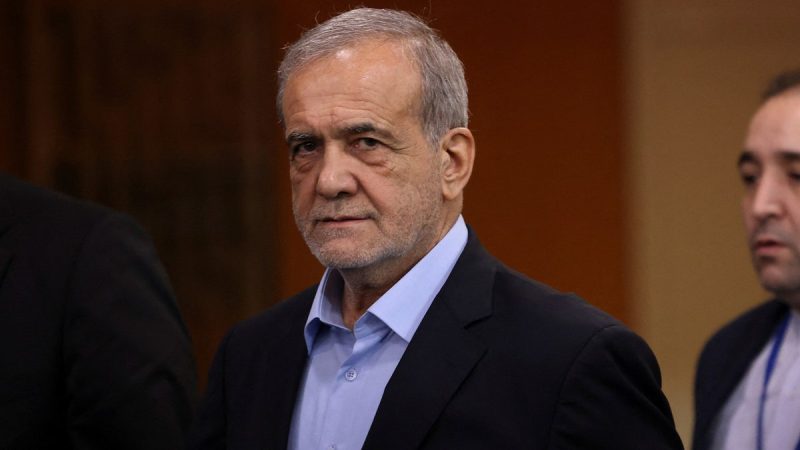
Iran spouts ‘propaganda’ from UN podium, calls on Middle East to unite behind Tehran
In an address to the 79th United Nations General Assembly Tuesday, Iranian President Masoud Pezeshkian claimed to be the one playing peacemaker in the Middle East and, in a juxtaposition, accused Israel of supporting terrorism.
Pezeshkian called on the U.N. to ‘examine’ modern history and said, ‘Iran has never initiated a war. It has only defended itself heroically against external aggression, causing the aggressors to regret their actions,’ Pezeshkian said, adding that Iran does not ‘occupy’ territory or exploit resources for other countries.
‘It has repeatedly offered various proposals to its neighbors and international fora aimed at establishing lasting peace and stability,’ he said. ‘We have emphasized the importance of unity in the region and establishing a strong region.’
Iran’s claims of playing peacemaker in the Middle East are in stark contrast to its repeated involvement in proxy wars across the region, in which it has been heavily involved in Syria and Yemen, drawing deeper the lines of division between it and other powerful Sunni nations like Saudi Arabia and the United Arab Emirates.
But Iran’s deep involvement in the Middle East extends to one other area not generally endeavored by a nation state — terrorism.
While Pezeshkian claimed from the podium Tuesday that Israel both ‘covertly and overtly’ supports the Islamic State, Tehran is widely known to have not only backed terrorist organizations ardently opposed to Israel like Hamas, Hezbollah and the Houthis, but it has also helped build bridges between the Taliban and al Qaeda, providing the terrorist networks with arms, funding and even safe haven.
‘The Islamic Republic of Iran seeks to safeguard its own security, not to create insecurity for others,’ Pezeshkian also claimed. ‘We want peace for all, and seek no war or quarrel with anyone.’
Iran, which has also increasingly aligned itself with top adversarial nations of the West like Russia and North Korea, attempted to claim it has not chosen a side when it comes to Russia’s illegal war in Ukraine, despite it having provided Moscow with drones and, most recently, short-range ballistic missiles for its war effort.
‘We seek lasting peace and security for the people of Ukraine and Russia. The Islamic Republic of Iran opposes war and emphasizes the urgent need to end military hostilities in Ukraine. We support all peaceful solutions, and believe that dialog is the only way to resolve this crisis,’ the Iranian president said.
‘We need a new paradigm to address global challenges. Such a paradigm must focus on opportunities, rather than being obsessed with perceived threats,’ he added.
Pezeshkian called on ‘neighboring and brotherly countries’ to unite with Iran to advance what is best for the Middle East.
But the Iranian president also spoke directly to the U.S. and said Tehran is looking to ‘transcend’ the obstacles of the past and move forward with Washington, despite its withdrawal from the 2015 nuclear agreement under President Trump and the subsequent sanctions and trade restrictions that have, in large part, cut it off from the rest of the world.
‘My message to all states pursuing a counterproductive strategy towards Iran is to learn from history,’ Pezeshkian said before calling the U.S.’s sanctions a ‘crime against humanity.’
‘We have the opportunity to transcend these limitations and enter into a new era,’ he added.
But Pezeshkian’s comments rang hollow for some and, according to Behnam Ben Taleblu, Iran expert and senior fellow with the Foundation for Defense of Democracies, they were riddled with ‘propaganda.’
‘Short but certainly not sweet,’ he told Fox News Digital. ‘Pezeshkian dangled the prospect of a renewed diplomatic agreement, something which his regime will use as a literal shield against pressure on its expanding nuclear program and accountably against supporting a multi-front war against Israel.’
‘By blaming former President Trump in his speech and by bringing along technocratic staff involved in the JCPOA back in 201[8], Pezeshkian hopes to win support with certain crowds in Washington and Europe and run the clock against SnapBack, which expires in 2025,’ Ben Taleblu added. But despite Pezeshkian’s honeyed comments on renewing diplomatic conversations with the U.S., they are not expected to curry much favor with either side of the political aisle as it continues to ramp up its development of nuclear weapons.
